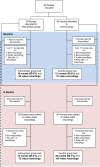Minimal improvement of nurses' motivational interviewing skills in routine diabetes care one year after training: a cluster randomized trial
- PMID: 23537327
- PMCID: PMC3637576
- DOI: 10.1186/1471-2296-14-44
Minimal improvement of nurses' motivational interviewing skills in routine diabetes care one year after training: a cluster randomized trial
Abstract
Background: The effectiveness of nurse-led motivational interviewing (MI) in routine diabetes care in general practice is inconclusive. Knowledge about the extent to which nurses apply MI skills and the factors that affect the usage can help to understand the black box of this intervention. The current study compared MI skills of trained versus non-trained general practice nurses in diabetes consultations. The nurses participated in a cluster randomized trial in which a comprehensive program (including MI training) was tested on improving clinical parameters, lifestyle, patients' readiness to change lifestyle, and quality of life.
Methods: Fifty-eight general practices were randomly assigned to usual care (35 nurses) or the intervention (30 nurses). The ratings of applying 24 MI skills (primary outcome) were based on five consultation recordings per nurse at baseline and 14 months later. Two judges evaluated independently the MI skills and the consultation characteristics time, amount of nurse communication, amount of lifestyle discussion and patients' readiness to change. The effect of the training on the MI skills was analysed with a multilevel linear regression by comparing baseline and the one-year follow-up between the interventions with usual care group. The overall effect of the consultation characteristics on the MI skills was studied in a multilevel regression analyses.
Results: At one year follow up, it was demonstrated that the nurses improved on 2 of the 24 MI skills, namely, "inviting the patient to talk about behaviour change" (mean difference=0.39, p=0.009), and "assessing patient's confidence in changing their lifestyle" (mean difference=0.28, p=0.037). Consultation time and the amount of lifestyle discussion as well as the patients' readiness to change health behaviour was associated positively with applying MI skills.
Conclusions: The maintenance of the MI skills one year after the training program was minimal. The question is whether the success of MI to change unhealthy behaviour must be doubted, whether the technique is less suitable for patients with a complex chronic disease, such as diabetes mellitus, or that nurses have problems with the acquisition and maintenance of MI skills in daily practice. Overall, performing MI skills during consultation increases, if there is more time, more lifestyle discussion, and the patients show more readiness to change.
Trial registration: Current Controlled Trials ISRCTN68707773.
Figures
References
-
- Pi-Sunyer FX, Maggio CA. The prevention and treatment of obesity. Application to type 2 diabetes. Diabetes Care. 1997;20(11):1744–1766. - PubMed
-
- Moore H, Summerbell C, Hooper L, Cruickshank K, Vyas A, Johnstone P, Ashton V, Kopelman P. Dietary advice for treatment of type 2 diabetes mellitus in adults. Cochrane Database Systematic Review. 2004;3:CD004097. - PubMed
Publication types
MeSH terms
Associated data
LinkOut - more resources
Full Text Sources
Other Literature Sources
Medical


